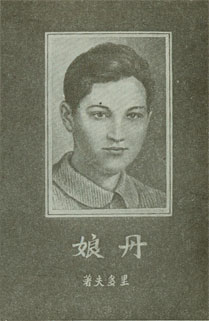
Zoya Kosmodemyanskaya
published in China
Once again I was left alone. But now I did not feel as sad and lonely as before. My work helped.
I have always wanted to thank from the bottom of my heart those of you who helped me in those days with your letters, your sympathy and your kindness. All of you who came to me and said firmly and insistently, "Do come to our factory. You must speak to our Komsomol members."
I know that when a person feels very bad, only one thing can help him—the consciousness that he is needed by others, that his life is not useless. When my misfortune overtook me, you helped me to believe that I was needed, and not only by Shura, but by many, many other people. When he went away you did not let me, did not allow me, to remain alone. It was very difficult for me but it saved me. I knew I was needed.
There was a lot of work everywhere, work which called for loving hands and a loving heart. The war had robbed many children of their homes and families. "Orphan," a word which we had almost forgotten, claimed our attention with grim insistence. And something had to be done so that children who had lost their parents in the war should not feel fatherless and lonely. They had to be given back the warmth, love and security that only home and family can give.
And I began to work.
As many more children's homes as possible—good ones, really comfortable and well provided for! As many more real teachers as possible, efficient and loving! The children needed shoes, clothes, food, and even more than that—love, warmth, kindness. Children's homes sprang up everywhere, in all the towns, at factories and collective farms. Everybody wanted to do something for the children of our war dead.
And it meant so much to me that I could take part in this work!
 |
| The cover of a book about Zoya Kosmodemyanskaya published in China |
I had to travel a lot in those days. I went to Tambov, Ryazan, Kursk, Ivanovo, then to Byelorussia and the Ukraine, to the Altai, to Tomsk and Novosibirsk. Everywhere there was no end of work, everywhere there were orphaned children. Shelter had to be found for them in a new family or in a children's home. And everywhere 1 was met by eyes full of trust and affection. And I kept learning, learning courage and endurance from my people.
As far back as the end of 1944 the Red Cross Society sent me to Leningrad.
On the pedestals where once Klodt's wondrous steeds had reared and strained out of the hands of bronze youths stood boxes of flowers so that the accustomed eye should not he offended by the absence of the familiar statues. Notices on the walls still warned passers-by, "This side more dangerous during artillery bombardment." But the people of Leningrad, surrounded with the help of the whole country, had long since started repairing their houses, putting back the windowpanes, levelling and asphalting the pavements.
There was an elderly woman with me, a welder from the Elektrosila Plant. She told me how during the blockade she and her husband had worked side by side at their lathes. They worked with their last strength, starved, overcoming weakness by sheer will power, by a stubborn desire not to surrender. One day, when she turned round to look at her husband, she saw him lying on the floor, dead. She went up to him, stood there for a moment, and then went on working. She worked and her husband lay beside her, by the lathe which he had not quitted until his last breath. To stop work meant giving in to the enemy, and she did not want to give in.
I heard of an architect in Leningrad who during the very worst, the most difficult days of the blockade had designed the Arch of Victory. I was told of mothers whose children had died defending Leningrad: those mothers did not spare their last strength to save the children of others from starvation. I listened to such stories, and again I said to myself, "I have no right to surrender to my grief. These people have endured a great calamity, their sufferings and losses have been as great as mine. They live and work. I must live and work too."
And I knew one thing more: Zoya is loved by the people. With her name on their lips our people, her comrades and mine, went into battle, worked in the factories, worked in the fields; her fame reached a boy from Krasnodon, Oleg Koshevoi, who told his friends about her, and together they repeated her feat and took their places beside her as her brothers and sisters, children of our great and beloved Motherland.
The memory of Zoya is alive and vivid. She is dear not only to me. The people remember her alive, valiant, unbending.
And that helped me to live too.
Next: Letters
